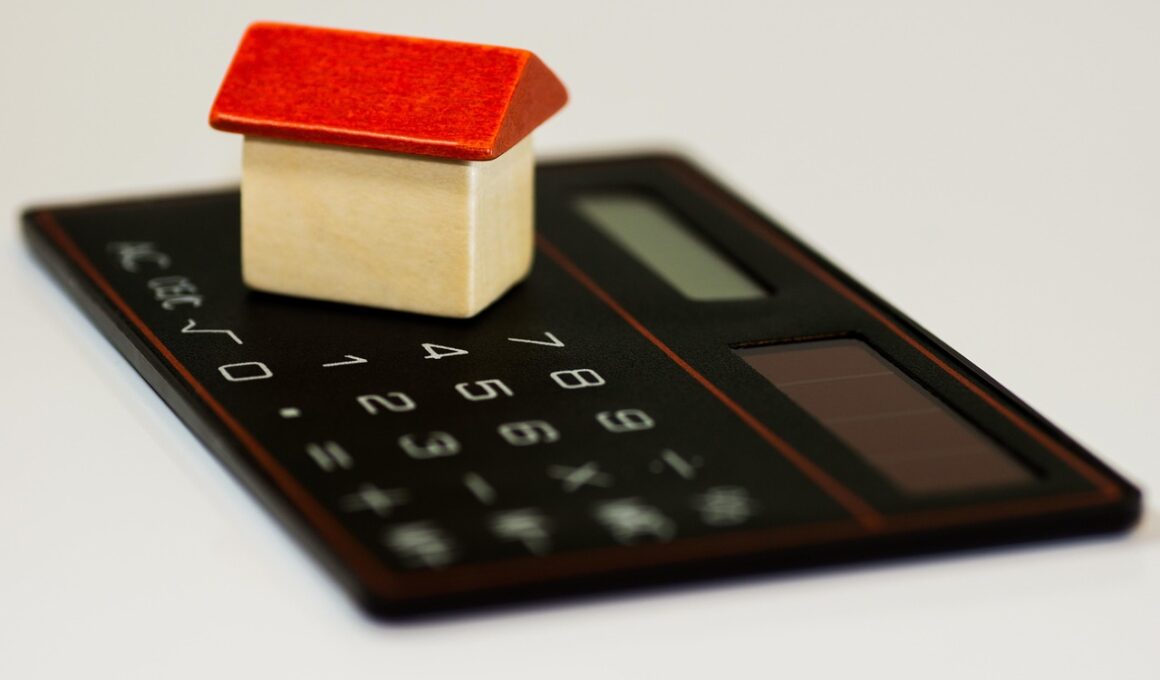How to Calculate Your Mortgage Payments
Calculating your mortgage payments can be an essential skill for prospective homeowners. Understanding your monthly financial obligations helps you plan your budget effectively. The basic formula for this calculation includes the principal amount, interest rate, and loan term. First, decide how much you wish to borrow. This is known as the principal, and it significantly influences your monthly payment. Then, you need to know the annual interest rate expressed as a decimal. It represents the lender’s charge for borrowing money. Additionally, determine the loan term, usually expressed in years. A 30-year loan is standard, but shorter terms cost less interest overall. Once you gather these details, you can use the formula: M = P[r(1+r)^n] / [(1+r)^n – 1]. Here, M is the total monthly mortgage payment, P is the principal, r is the monthly interest rate, and n is the number of payments. With practice, this calculation becomes easier, making homeownership more accessible. You can also use online mortgage calculators for quick results, ensuring all potential homeowners can grasp their financial possibilities.
In addition to the basic formula, it’s vital to consider other costs associated with a mortgage. These may include property taxes and homeowner’s insurance, which many lenders require to be included in your monthly payment. When calculating your budget, add these figures to the principal and interest to get a comprehensive view of your monthly obligations. Understanding the impact of taxes and insurance on your mortgage can significantly alter your financial planning. For example, if your property taxes are high, it may push your monthly payments beyond your comfort level. Also, remember the potential for private mortgage insurance, or PMI, if your down payment is less than 20%. PMI adds to your monthly payment, protecting the lender if you default. Moreover, consider the benefit of making a larger down payment to reduce your principal, which in turn decreases your monthly payments. Planning your finances with these costs contributes to a better understanding of home affordability. This knowledge not only assists in budgeting but also informs your decisions about home purchase options and long-term financial sustainability.
Extra Factors Affecting Mortgage Payments
Various factors can influence your mortgage payments aside from the principal, interest, taxes, and insurance. One vital factor is the loan type, as different loan programs offer varied interest rates and terms. Fixed-rate loans guarantee the same interest payments throughout the loan term, while adjustable-rate mortgages (ARMs) may start lower but can increase over time, typically adjusting every few years. Evaluating which loan type aligns with your financial situation is essential for making informed decisions. The location of the property also affects your monthly mortgage payment. Areas with higher property values lead to larger loans and, consequently, increased payments. Furthermore, your credit score impacts the interest rate and loan approval. A higher score typically translates to lower rates, decreasing monthly costs. Financial stability, including earnings and existing debt, is equally crucial in securing favorable mortgage terms. These factors cumulatively influence the overall mortgage process. Therefore, thorough research and preparation, including comparing lenders and loan products, significantly improve your chances of securing the best deal possible on your mortgage.
Once you have a clear understanding of your mortgage payment structure, it’s time to plan for potential changes, like refinancing. Refinancing your mortgage can reduce your interest rate, modify your loan term, or both. This can lead to lower monthly payments and significant savings over the life of the loan. If interest rates drop significantly after you secure your mortgage, consider evaluating refinancing options. Generally, refinancing is beneficial when you can cut your rate by at least half a percentage point unless you plan to remain in your home for a short period. However, it’s essential to factor in refinancing costs, including appraisal fees and closing costs, before committing. Calculate how long it may take to recoup these expenses through reduced monthly payments. Planning for changes in interest rates and being vigilant about checking your financial circumstances allow you to make the most advantageous choices regarding your mortgage. By maintaining an adaptable approach, you can ensure your housing expenses are manageable and in line with your financial goals throughout homeownership.
Understanding Amortization Schedules
Understanding your mortgage’s amortization schedule is crucial for effective financial planning. This schedule illustrates how your loan balance declines over time, providing insight into your payment distribution. Initially, a larger portion of your payment covers interest. However, as time elapses, more of your payment goes toward reducing the principal. This gradual shift can impact your overall financial strategy. Knowing how repayments are structured helps you gauge interest costs over the loan’s lifespan. You may want to pay down your mortgage faster if you identify that many of your early payments solely cover interest. Additional payments toward principal can reduce the total interest paid. Moreover, some lenders permit extra payments without penalties, a great strategy for interest savings. You can create the schedule using mortgage calculators available online, which often allow you to experiment with different repayment strategies. Utilizing these tools helps visualize how much interest you’ll pay over time. Engaging with your amortization schedule empowers you to be proactive in managing your mortgage, ensuring your home loan aligns with your broader financial objectives.
Another important component of your mortgage is understanding closing costs, which can be substantial. Closing costs generally range from 2% to 5% of the project’s purchase price and include various fees. These fees often encompass appraisal fees, title insurance, and attorney fees, among others. Be prepared for these costs in your budget before signing the contract. It’s wise to ask your lender for a breakdown of these expenses to avoid surprises. Some borrowers opt to roll their closing costs into the loan amount, but this increases monthly payments and overall interest paid in the long run. Alternatively, some lenders might offer “no-closing-cost” mortgages, meaning they cover fees upfront in return for a higher interest rate. Understanding these choices can greatly influence your mortgage application. If you prefer lower monthly payments, negotiating these terms may be a smart move. Additionally, be mindful of other expenses like home inspection and moving costs. Factoring all potential expenses leads to a comprehensive financial overview and ensures informed decisions, ultimately easing the home-buying process.
Tips for First-Time Homebuyers
As a first-time homebuyer, you may feel overwhelmed by the prospect of calculating mortgage payments. However, being informed and proactive simplifies this process greatly. Start by assessing your financial situation meticulously. Create a detailed budget that accounts for all your income, expenses, and savings. Evaluating your debt-to-income ratio is crucial, as lenders typically look for a ratio below 43%. This assessment informs both your budget and the mortgage amount you can afford. Additionally, shop around for lenders. Rates and terms can vary significantly, so gathering quotes from multiple lenders provides a wider perspective on available options. Seek preapproval before house hunting, as this will give you an accurate understanding of your borrowing capacity and signal seriousness to sellers. Educating yourself about various loan types further empowers your negotiations. Knowing the distinctions between conventional loans, FHA loans, or VA loans shapes your choices and enables you to align with your financial aspirations. Lastly, consult with a mortgage professional if needed, as expert guidance can illuminate the complexities of mortgage calculations, ensuring you make informed, confident decisions.
To conclude, understanding how to calculate mortgage payments can be empowering, especially for first-time buyers. With careful consideration of the principal, interest rates, and additional costs like taxes, insurance, and PMI, you can navigate the home-buying process more confidently. Utilize available resources such as calculators to simplify calculations and even consider consulting experts for assistance. When planning your budget, remember to contend with closing costs, which significantly impact your financial picture. Preparing for potential costs and staying informed about loan types offers significant advantages in making sensible financial choices. Furthermore, maintaining a close watch on interest rates and economic conditions helps in deciding when to refinance, should your circumstances change. Finally, don’t underestimate the importance of assistance from real estate professionals, as they can ease your journey through the process of mortgage calculations and home buying. Embrace this knowledge, and you’ll be well on your way to achieving homeownership. Utilize these strategies to ensure your financial investments are sound, guiding you toward a more secure and fulfilling residential experience.





